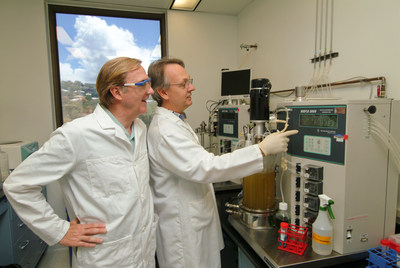Hawaii Biotech, Inc. Awarded Grant To Develop Chikungunya Virus Vaccine
HONOLULU and HOUSTON, Aug. 30, 2016 /PRNewswire/ -- The National Institute of Allergy and Infectious Diseases, part of the National Institutes of Health, has awarded Hawaii Biotech, Inc. a Small Business Innovation Research Phase I grant to develop a vaccine to protect against infection caused by the mosquito-borne chikungunya virus.

Chikungunya virus is transmitted by the bite of the Aedes aegypti mosquito, the mosquito that also transmits dengue and Zika virus. Common symptoms of chikungunya virus infection are fever and joint pain. Other symptoms may include headache, muscle pain, joint swelling or rash. At this time there is no vaccine to prevent or therapeutic medicine to treat chikungunya virus infection. Chikungunya has emerged as a major arbovirus infection that threatens global public health.
Hawaii Biotech is collaborating with Baylor College of Medicine and the Sabin Vaccine Institute on this joint award. David Clements, director of Vaccine Research at Hawaii Biotech, will be coordinating development efforts with Dr. Coreen Beaumier, assistant professor at the National School of Tropical Medicine at Baylor and co-director of Product Development at Sabin Vaccine Institute and Texas Children's Hospital Center for Vaccine Development, together with Dr. Maria Elena Bottazzi, deputy director, and Dr. Peter Hotez, dean of the National School of Tropical Medicine at Baylor and president of Sabin Vaccine Institute.
The vaccine is being developed using Hawaii Biotech's proprietary recombinant subunit protein vaccine platform, which is also currently being used to develop a vaccine for Zika. The same platform technology was previously used to develop vaccines against similar mosquito-borne viruses including dengue and West Nile, which have been evaluated in human clinical studies.
"This award enables Hawaii Biotech to apply our knowledge and experience in recombinant subunit vaccine development to this important emerging disease threat," said Clements. "The recent outbreaks of both chikungunya and Zika viruses in tropical and sub-tropical areas pose major public health threats to individuals living in these areas, as well as global travelers."
"Hawaii Biotech is pleased to be able to contribute to the protection of people against illness from these mosquito-borne threats," added Dr. Elliot Parks, HBI's CEO.
"We're thrilled to partner with Hawaii Biotech on this important vaccine," said Hotez. "Chikungunya, like Zika, is infecting large populations throughout the Latin America and Caribbean region. In addition, chikungunya transmission has now begun in Texas. This is a disease that will be endemic to the Western Hemisphere for years to come."
"This grant offers us an exciting opportunity to partner our expertise in preclinical testing with Hawaii Biotech on an effort to develop a vaccine to Chikungunya virus, an emerging mosquito-borne threat," said Beaumier.
Hawaii Biotech is also collaborating with Drs. Beaumier and Hotez and others at Baylor and Sabin Vaccine Institute in Houston on the development of a therapeutic West Nile virus vaccine. "This funding will allow Hawaii Biotech to expand our productive collaborations with our colleagues at Baylor College of Medicine and the Sabin Vaccine Institute," Dr. Parks added.
About Hawaii Biotech, Inc. (HBI):
Hawaii Biotech is a privately held biotechnology company focused on the development of prophylactic vaccines for established and emerging infectious diseases and anti-toxin drugs for biological threats. HBI has developed proprietary expertise in the production of recombinant proteins that have application to the manufacture of safe and effective vaccines, diagnostic kits, and as research tools. HBI completed successful first-in-human Phase 1 clinical studies with both West Nile virus and dengue virus vaccines in healthy subjects. HBI is currently engaged in developing a pipeline of recombinant subunit vaccines, including vaccine candidates for Zika virus, West Nile virus, tick-borne flavivirus, malaria, Crimean-Congo hemorrhagic fever, and Ebola. HBI is also continuing the development of small molecule anti-toxin drugs for anthrax and botulism. Founded in Hawaii in 1982, HBI is headquartered in Honolulu. For more information, please visit: www.hibiotech.com
About Baylor College of Medicine (BCM):
Baylor College of Medicine (www.bcm.edu) in Houston is recognized as a premier academic health sciences center and is known for excellence in education, research and patient care. It is the only private medical school in the greater southwest and is ranked 20th among medical schools for research and 9th for primary care by U.S. News & World Report. Baylor is listed 20th among all U.S. medical schools for National Institutes of Health funding and number one in Texas. Located in the Texas Medical Center, Baylor has affiliations with seven teaching hospitals, and jointly own and operates Baylor St. Luke's Medical Center, part of CHI St. Luke's Health. Currently Baylor trains more than 3,000 medical, graduate, nurse anesthesia, physician assistant and orthotics students, as well as residents and post-doctoral fellows. Follow Baylor College of Medicine on Facebook (http://www.facebook.com/BaylorCollegeOfMedicine) and Twitter (http://twitter.com/BCMHouston)
About Chikugunya Virus (CHIKV):
Chikungunya virus is most often spread to people by Aedes aegypti and Aedes albopictus mosquitoes. These are the same mosquitoes that transmit dengue and Zika viruses. The most common symptoms of chikungunya virus infection are fever and joint pain. Other symptoms may include headache, muscle pain, joint swelling, or rash. Outbreaks have occurred in Africa, Asia, Europe, the Indian and Pacific Oceans. In late 2013, chikungunya virus was found for the first time in the Caribbean islands and Americas. The first transmission in Texas in the continental US was reported in 2016. Infected travelers are most often the source of introductions to new areas. There is no vaccine to prevent or medicine to treat chikungunya virus infection. For more information, please visit: www.cdc.gov/chikungunya/index.html
Photo - http://photos.prnewswire.com/prnh/20160829/402457
To view the original version on PR Newswire, visit:http://www.prnewswire.com/news-releases/hawaii-biotech-awarded-grant-to-develop-chikungunya-virus-vaccine-300319786.html
SOURCE Hawaii Biotech, Inc.

